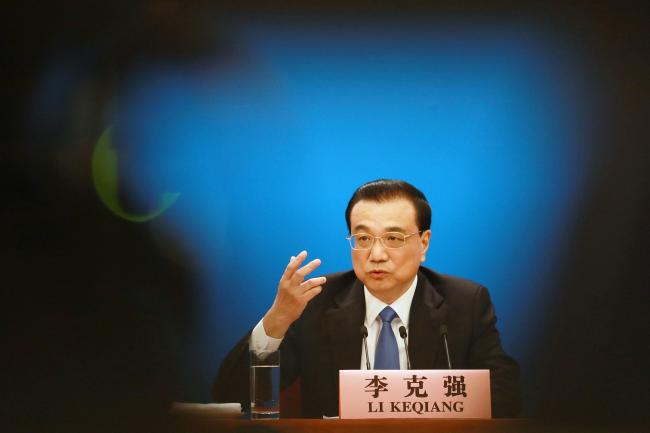(Bloomberg) -- China will stick to its current targeted economic support strategy and resist the temptation to engage in large-scale stimulus like quantitative easing or a massive expansion in public spending, Premier Li Keqiang said.
“We certainly need to take strong measures to face the downward pressure,” Li told a news conference Friday at the close of the annual National People’s Congress session in Beijing. “Such an indiscriminate approach may work in the short run but may lead to future problems. Thus it’s not a viable option. Our choice is to energize market players.”
China’s annual gathering of leaders that started last week has delivered a raft of policy initiatives, while maintaining a focus on using tax cuts and other “targeted” measures to address the weakness in output. China’s deepening slowdown has pushed unemployment higher, intensifying pressure on that calibrated stimulus strategy.
Employment First
Li reiterated the government’s new emphasis on preventing large-scale job losses in the wake of the slowdown, a day after data showed the unemployment jumped to 5.3 percent in February, the highest level in two years.
He said the “employment first” strategy put jobs on the same level of priority as fiscal and monetary policy. He also elevated the number of jobs the economy will create “in practice” this year to 13 million from the 11 million target announced last week in his economic policy report.
Tax cuts announced last week could exceed the proposed plan of 2 trillion yuan ($298 billion) this year. Included in that total is a cut of 3 percentage points to the top bracket of value-added tax aimed at benefiting the manufacturing sector. Policy makers have also cut bank reserve requirements multiple times since last year, releasing liquidity for lending. Li indicated use of that tool would continue.
“We can use price tools such as reserve-requirement ratios, interest rates,” Li said. “We are not going toward monetary easing, but effectively supporting the real economy.”
Li confirmed that the tax cuts would take effect on April 1, and social security reductions would take effect from May 1.
“We won’t let the major economic indicators slide out of their proper range,” Li said.
The record size of the tax cut wasn’t matched by an equivalent expansion in the size of the government’s targeted budget deficit, which was nudged wider to 2.8 percent of gross domestic product from 2.6 percent in 2018. As part of measures to plug the gap, Li announced that the government has already raised 1 trillion yuan in transferred profits from state-owned enterprises and banks.
“The central government is determined to ask specific financial institutions and some state-owned enterprises to increase the profits they turn into the national treasury,” Li said. “We’ll also take back the idle funds accumulated over a long time.”On U.S.-China ties, Li stuck to the message China has pushed for months, reiterating that there were “broad common interests” between the two sides and that they should seek “win-win” outcomes. He said that trade talks between were still underway and that China hoped that “good outcomes will be delivered out of those consultations.”
No Spying
China passed a new law governing foreign investment this week, which aims to reassure companies that they’re on a level with domestic companies. The law was passed by the rubber-stamp legislative chamber on Friday to take effect on Jan. 1.
The accusation that China coerces intellectual property from foreign firms operating on its territory and stacks the deck against them through regulation has become a key point in the dispute with the U.S.
Li also responded to criticisms from the U.S. and other Western countries that Chinese tech giant Huawei Technologies Co. helps the Chinese government spy.
Chinese national security laws require that any organizations must cooperate with national intelligence work -- raising fears that the government could lean on Huawei to compromise a telecommunications network in another country.
“Let me tell you explicitly. This is not consistent with Chinese law, this is not how China behaves,” Li said. “We did not do that in the past and will not do that in the future.”
